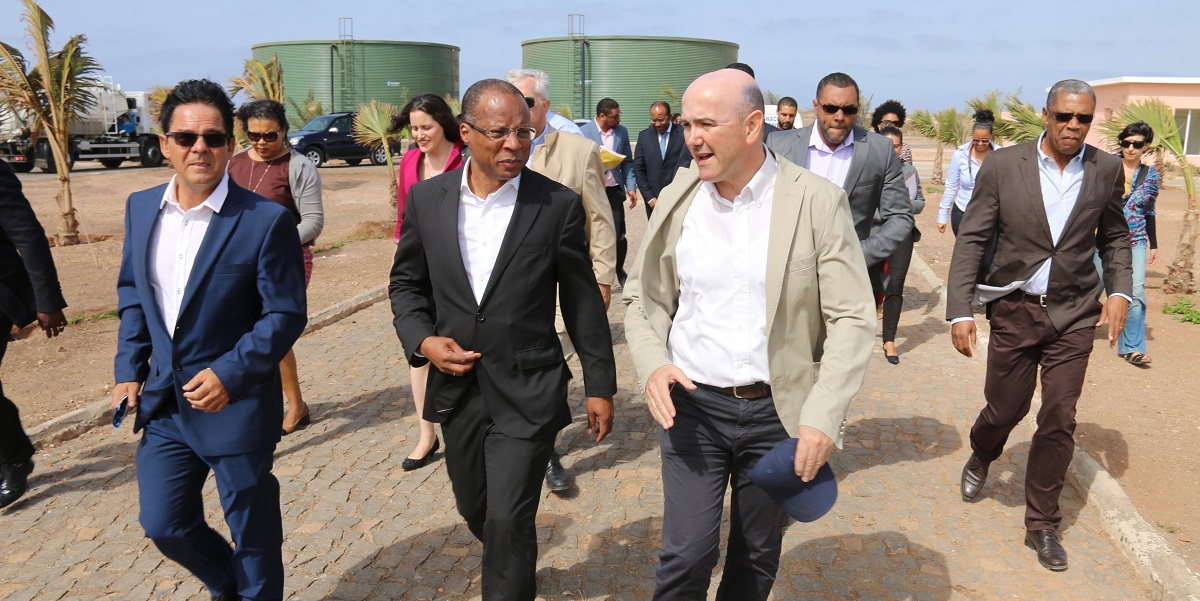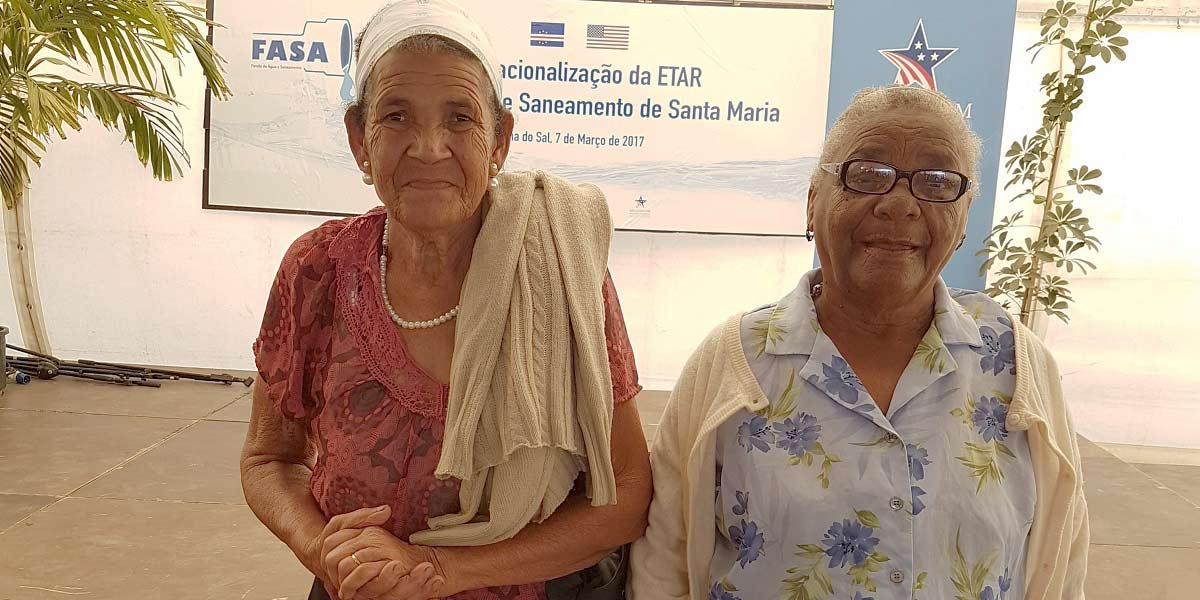Of the nine inhabited islands that make up the West African archipelago of Cabo Verde, the island of Sal is one of the driest. The country receives less than 9 inches of rain on average each year and has one of the highest prices of water for consumption in Africa.
The country’s water scarcity makes it reliant on the energy-intensive process of desalinization, which is made even more costly by the high price of imported fuel to power the national grid. Severe droughts and a lack of employment opportunities have historically contributed to mass emigration, particularly to the United States and Portugal. Today, more people of Cabo Verdean descent live outside the country than in it.

MCA-Cabo Verde
Cabo Verde’s Prime Minister José Ulisses de Pina Correia e Silva (front row, center) was among national, local and U.S. officials who joined island of Sal residents at the inauguration of the Santa Maria Wastewater Treatment Plant on March 7. As part of the MCC-Cabo Verde Compact signed in 2012, MCC invested in the plant’s rehabilitation to support the Government of Cabo Verde in more effectively delivering affordable water and sanitation services to its citizens.
But population growth and the needs of the country’s tourism industry have strained Cabo Verde’s water infrastructure. In the town of Santa Maria, Sal’s densely populated hotel hub, many residents and businesses rely on expensive private wastewater removal and water treatment. Fifty-four percent of people in the country’s rural areas and 16 percent of those in urban areas don’t have access to flushing toilets or other sanitation improvements. Some of the poorest residents in Sal resort to dumping waste in unpopulated areas of the island, and open-air defecation remains commonplace in rural areas, leading to incidences of waterborne diseases.
MCC is supporting the Government of Cabo Verde in bringing a wastewater plant on the island of Sal online and strengthening the water and sanitation sector to better serve its people.
As part of a $66 million MCC-Cabo Verde Compact signed in 2012, MCC is supporting the Government of Cabo Verde in bringing the plant online and strengthening the water and sanitation and land management sectors to better serve its people. By developing a financially sound, transparent and accountable basis for the delivery of water and sanitation services to the people of Cabo Verde, MCC’s investments are helping to make these vital services more effective and affordable, including for women-led households and other vulnerable populations. More than 600,000 people are estimated to benefit from the agency’s investments over 20 years.
The compact includes the creation of an infrastructure grant facility that funds needed infrastructure and capital improvements in the water and sanitation sector. It provided grants on a competitive, cost-sharing basis, including the $1.9 million needed to rehabilitate the Santa Maria Wastewater Treatment Plant.

MCA-Cabo Verde
Maria Agusta Fortes (right) is a 77-year-old facilities operator who spends hundreds of dollars of her modest income each year to have the household septic tank emptied. The MCC-funded rehabilitation of the Santa Maria Wastewater Treatment Plant expands water and sanitation services to low-income residents like Fortes, who is looking forward to saving money and time by being connected to the town’s sewage system for the first time in her life.
Part of this work includes running subsidized sewage lines to low-income customers like Maria Agusta Fortes. The 77-year-old works as a facilities operator and raised her eight children on a monthly income that never exceeded $500. Until now, she had little choice but to spend hundreds of dollars of her modest salary each year to empty the household septic tank. When her children were younger, there were times when Fortes had to choose between being able to flush the toilet and feeding her family. Knowing the role sanitation plays in the health of her family, Fortes usually chose the former, but it was never easy. Now, she is looking forward to saving money and time by being connected to the town’s municipal sewage system for the first time in her life.
Carlos Jorge Santos, Director General of Oasis Atlantic Group’s hotel operations in Cabo Verde, hopes that cleaner beaches will enable Cabo Verde to earn the prestigious Blue Flag certification, which holds members to high water quality standards. Oasis owns two hotels on Sal, and the group’s leadership is ready to take advantage of expanded wastewater treatment facilities on the island.
“With untreated wastewater,” Santos said, “there is the risk that the beaches will be contaminated, which obviously hurts us.”
Santos anticipates that cleaner beaches will boost the island’s reputation as a global tourism destination and draw new visitors to Sal.
To ensure the sustainability of MCC’s water and sanitation investments beyond the compact’s end later this year and support projects critical to the country’s economic growth, the Government of Cabo Verde plans to establish a revolving water and sanitation sector fund based on the success of the compact’s infrastructure grant facility.
Building on the impact of its 2005 investment, MCC is supporting the Government of Cabo Verde in strengthening its institutions to improve water and sanitation services for its citizens, unleash the tourism industry’s full potential, and help people lift themselves out of poverty.

